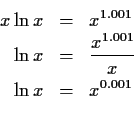A natural question to ask is, which iterator is better?
This question is nontrivial to answer, and contradicts the
spirit of the heuristic, which is to try all of them.
We would like to try a large number of formulas and not conjecture
which is the best one and use it alone.
Yet an intuitive and very economic measure of the quality of the
iterators is
![]() ,
the number of occurrences of xon the right-hand side of the iterator.
A smaller
,
the number of occurrences of xon the right-hand side of the iterator.
A smaller ![]() is considered better.
The degenerate case is a good example.
If
is considered better.
The degenerate case is a good example.
If
![]() ,
we have an explicit expression for the root.
Using iterators which have the minimal
,
we have an explicit expression for the root.
Using iterators which have the minimal ![]() guarantees, to
a certain degree, that we will not be generating more complicated
trivial iterators.
guarantees, to
a certain degree, that we will not be generating more complicated
trivial iterators.
If at any point during our isolation or after trial simplification,
the resulting equation has a smaller number of occurrences of x,
we will derive all possible iterators arising from this shortened
equation.
For example,


The use of ![]() as a measure of iterator quality seems to work
in practice, although we cannot prove this generally.
Certainly there are examples of two iterators for the same
equation, where
as a measure of iterator quality seems to work
in practice, although we cannot prove this generally.
Certainly there are examples of two iterators for the same
equation, where
![]() ,
and F1 behaves worse
than F2.
,
and F1 behaves worse
than F2.